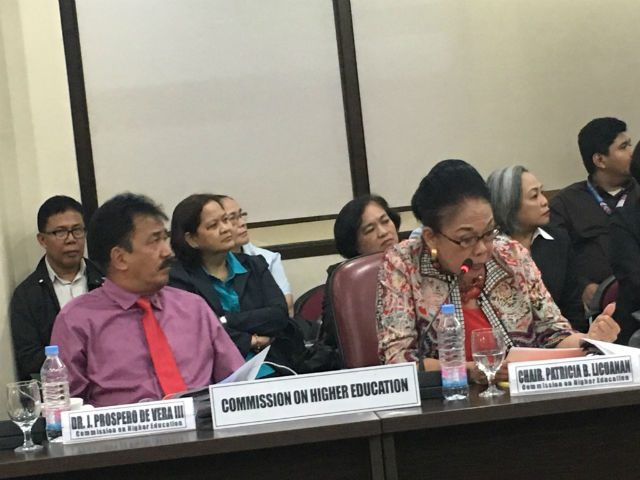SUMMARY
This is AI generated summarization, which may have errors. For context, always refer to the full article.

MANILA, Philippines – Lawmakers want the Commission on Higher Education (CHED) to explore the possibility of requiring financially able students to pay for their tuition in state universities and colleges (SUCs) under the new law.
Albay 1st District Representative Edcel Lagman made the appeal to CHED as it defended its proposed P13.523-billion budget for 2018 before the House appropriations committee on Thursday, August 10.
Lagman asked CHED Chairperson Patricia Licuanan to conduct a study if it would be better for students from middle to upper classes to be required to pay for their own tuition instead of just giving them the choice to voluntarily opt out of the provisions under the Universal Access to Quality Tertiary Education Act.
“I’m just getting information or data or some standards where some students who can afford to pay may not avail of this program not just on a voluntary basis but as part of the law, because this is a social justice legislation,” said Lagman.
Bagong Henerasyon Representative Bernadette Herrera-Dy also suggested CHED may look at the University of the Philippines’ bracketing system as a model for the free tuition law’s implementing rules and regulations.
“I’m a product of UP, but of course, I think the bracket system is effective in the sense that if I know that my parents can pay for it, then what I can pay for can subsidize other students who cannot pay for their college tuition,” said Dy in Filipino.
Licuanan said CHED would look into the suggestions. (READ: Who will benefit from the free tuition law?)
“If perhaps this is something that the Congress decides that it wants to do, then some study has to be done,” she said.
The CHED chairperson, however, said the current form of Republic Act (RA) No. 10931 mandates the government to offer free tuition for all in SUCs, whether poor or rich students.
“Right now, as the law stands, I think it was intended that it be applied to everyone. And so as I’ve said, if we are to implement the law as it is, that’s what we have to do,” said Licuanan.
CHED’s proposed budget for 2018 currently does not contain allocations for the implementation of RA 10931. President Rodrigo Duterte was not expected to sign it into law, given his economic managers’ strong opposition to the measure.
CHED Commissioner Prospero de Vera III said the government would spend an estimated P16.8 billion for the first year of implementation of the free tuition law in 112 SUCs. Another P3 billion to P4 billion will be used for technical-vocational education.
House appropriations panel chairperson Karlo Nograles said they are considering realigning part of the budgets of the Department of Information and Communications Technology, Department of Agrarian Reform, and Department of Transportation to help fund the measure.
De Vera said SUCs may also be asked to tighten their admission policies in order to stem possible effects of the free tuition law. – Rappler.com
Add a comment
How does this make you feel?
There are no comments yet. Add your comment to start the conversation.